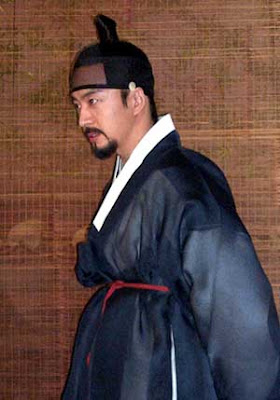
애국가 [Aegukga] / The national anthem of South Korea
동해 물과 백두산이 마르고 닳도록
(Donghae mulgwa Baekdusani mareugo daltorok)
จนกว่าคลื่นทะเลตะวันออกจะเหือดแห้ง ขุนเขาแผ็กตูจะทลาย
하느님이 보우하사 우리나라 만세
(Haneunimi bouhasa urinara manse)
พระเจ้าจะทรงปกป้องแผ่นดินของเราชั่วกัลปาวสาน เกาหลีบ้านเรา
무궁화 삼천리 화려강산
(Mugunghwa samcheolli hwaryeogangsan)
กุหลาบชารอน ดินแดนแห่งทิวเขาสูงพันลี้และแม่น้ำ
대한사람 대한으로 길이 보전하세
(Daehansaram daehaneuro giri bojeonhase)
ประชาชนจะปกป้อง เกาหลีจะคงอยู่ตลอดไป
남산 위에 저 소나무 철갑을 두른 듯
(Namsan wie jeo sonamu cheolgabeul dureun deut)
ดุจดั่งต้นสนบนขุนเขานัม เราจะยืนหยัดทำหน้าที่ต่อไป
바람서리 불변함은 우리 기상일세
(Baram seori bulbyeonhameun uri gisangilse)
เป็นสายลมหรือเกร็ดน้ำค้างแข็งไม่มีวันเปลี่ยนแปลงจิตเราจะยืนหยัดต่อไป
(Ga-eul haneul gonghwalhande nopgo gureum eopsi)
ท้องฟ้ายามเย็นในฤดูร้อนใบไม้ร่วง กระจ่างใสไร้เมฆหมอก
밝은 달은 우리 가슴 일편단심일세
(Balgeun dareun uri gaseum ilpyeondansimilse)
สีน้ำเงินเข้ม ขอเราเป็นดวงจันทร์ทอแสง มั่นคงเป็นหนึ่งเดียวและแท้จริง
ซ้ำ * 이 기상과 이 맘으로 충성을 다하여
(Ai gisanggwa i mameuro chungseong-eul dahayeo)
ด้วยจิตนั้นด้วยใจนั้น ความซื่อสัตย์ หัวใจและมือ ขอพวกเราจงรัก
괴로우나 즐거우나 나라 사랑하세
(Goerouna jeulgeouna nara saranghase)
มาเลยความเศร้า มาเลยความสุข นี่คือแผ่นดินที่เรารัก

LYric Meaninf of 애국가 [Aegukga]
Until the day when the East Sea's waters
and Mt. Baekdu are dry and worn away,
God protect and preserve us. Long live our nation!
The pinetree atop foremountain stands firmly
unchanged under wind and frost as if wrapped in armour,
as is our resilient spirit.
Autumn sky is void and vast, high and cloudless,
the bright moon is our heart, undivided and true.
With this spirit and this mind, give all loyalty,
in suffering or in joy, love the country.
Three thousand Li of splendid rivers and mountains,
filled with Roses of Sharon;
Great Korean People, stay true to the Great Korean way.
---------------------

เพลงชาติของประเทศเกาหลีใต้
คนเกาหลีเป็นคนที่รักในชาติของตนเป็นอย่างมาก เพลงชาติของประเทศก็มีความหมายที่บ่งบอกถึงความรักชาติเป็นอย่างยิ่ง เรามาทำความรู้จักกับประวัติของเพลงชาติของประเทศนี้กันซักนิด…
เพลงของผู้รักชาติ ( 애국가 อ่านว่า เอกุกกา) เป็นเพลงชาติประเทศเกาหลีใต้ เชื่อกันว่าคำร้องได้ประพันธ์ขึ้นใน ค.ศ. 1896 ซึ่งจารึกอยู่ที่ประตูอิสรภาพโดย ยุนชิโฮ (연신호) นักการเมือง หรือ อันชางโฮ (안창호) ผู้ใช้นามปากกา โดซาน (도산) ผู้นำในการต่อสู้เพื่อเอกราชของเกาหลี และเป็นนักการศึกษา ในช่วงที่เกาหลีตกเป็นเมืองขึ้นของญี่ปุ่น เพลงนี้ได้รัองโดยชาวเกาหลีโพ้นทะเล เพื่อขอพรให้ประเทศเกาหลีได้รับอิสรภาพ ต่อมา อันอิกแท (안익태) นักดนตรีเกาหลีในสเปน ผู้ประพันธ์ทำนองเพลงนี้ในปี ค.ศ. 1935
เพลงนี้ได้บรรเลงในพิธีฉลองการสถาปนาสาธารณรัฐเกาหลี ในวันที่ 15 สิงหาคม ค.ศ. 1948 โดยนายลีซึงมาน (리승만) ประธานาธิบดีคนแรกของสาธารณรัฐเกาหลี หลังการปลดปล่อยเป็นอิสระจากญี่ปุ่นเป็นเวลาสามปี และนำมาใช้เป็นเพลงชาติในปีเดียวกัน
애국가 [Aegukga]
Aegukga is the national anthem of South Korea, though it is not legally recognized as such. The title literally means "The Song of Love for the Country," or "The Patriotic Song."
It is believed that the lyrics were written at the time of the corner stone ceremony of the Independence Gate in Seoul in 1896 by Yun Chiho, a politician, or by An Chang-ho, a pro-independence leader and educator. Initially, Aegukga was sung to the Scottish folk tune "Auld Lang Syne" that American missionaries had taught. The Provisional Government of the Republic of Korea (1919-1945) in Shanghai, China adopted it as their national anthem. At a ceremony celebrating the founding of South Korea on 15 August 1948, exactly three years after liberation from Japanese rule, the Scottish tune was finally replaced by the Finale of Korea Fantasia that Ahn Eak-tae had composed in 1935. The new "Aegukga" was later adopted under the Presidential Decree of 1948 by the then President Syngman Rhee (or Lee Seungman).
Roytavan : Writer
No comments:
Post a Comment
Note: Only a member of this blog may post a comment.